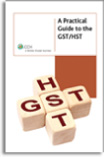The HST is effective as of July 1, 2010 and here are some of items that taxable or exempt from HST, Accountant GTA. If you’re at a wedding some time after the harmonized sales tax kicks in on July 1, don’t complain if you get cake for dinner and dessert. You’re saving the bride and groom some money.
When the HST takes effect in Ontario this week, wedding cake will be exempt from the levy but not catered meals. And if the wine is a bit salty, grin and drink up, because cooking wine is HST-free. The exemption for cakes and cooking wine are just two of the quirks that come with the controversial tax that will take the place of the provincial sales tax and the federal Goods and Services Tax Ontario this week.
The Canada Revenue Agency, which will administer the new tax system, devotes 35 pages to food and the HST, and there are deals to be had. It all comes down to what’s considered a snack or a grocery. Does the ice go in your drink or in the cooler? Are you about to scarf down a crisp, a fry or a spud? For example, if your pizza is still frozen, it will escape the bite of the HST, but if you drink soy milk instead of the bovine beverage, then your wallet will feel the pinch. Because a food or beverage hasn’t been defined under the federal Excise Tax Act, the federal revenue agency has made its own definition on products it considers to be basic grocery items and which are value-added, meaning a 13 per cent HST in Ontario.
“If a product’s tax status is in doubt, the CRA will consider the
manner in which the product is displayed, labelled, packaged, invoiced and advertised to determine its tax status,” said a January 2007 HST memorandum, written before the two provinces decided to adopt the tax.
“The CRA’s approach is based on the views of an average consumer,”
said the memor andum. When the federal Goods and Services Tax was introduced in 1991, it had its own oddities. For example, people paid GST on a single donut, but didn’t pay on a dozen.
That rule will hold true for the HST: buy a muffin or pastry on its own and
you pay tax, but buy a pack of six and it won’t be taxable. With the HST, basic groceries such as meat, potatoes, fruits and vegetables escape the HST, but once items are put in packages and processed somewhat, the
tax applies.
Anything considered a snack food such as carbonated drinks, candies, and chips are taxable, but Ontario residents will get a bit of a break on munchies that cost less than $4. Prepared food and drink sold for less than $4 will not be charged the eight-per cent Ontario portion of the HST.
Heated foods, salads and sandwiches and cheese and finger-food platters under $4 will also escape the tax in Ontario.
So will print newspapers that contain news, editorial and features of
interest to the general public, while flyers, inserts, magazines, periodicals
and shoppers are hit with the full tax. Fruit drinks, if they contain less than 25 per cent of natural fruit juice are taxable, and the tax man has taken a close look at that frozen concentrate.
For more information:
http://thetyee.ca/Blogs/TheHook/BC-Politics/2010/06/28/wacky-world-of-HST/



